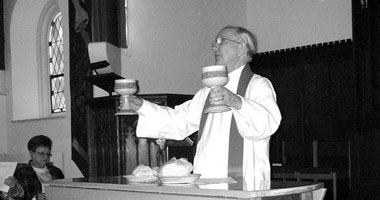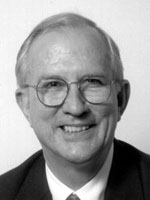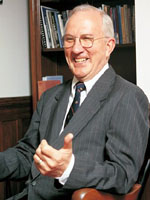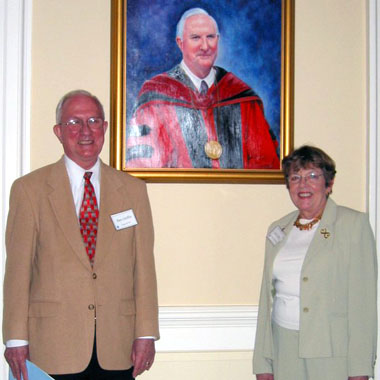 |
| Benjamin Griffin says he finds himself most centered when engaging the liturgical life of the church — particularly the Eucharist. |
I did not come to a theological school presidency ignorant of what a seminary is. After all, I had studied at three and for a dozen years served as a trustee, including a stint as chair of the board, at one of my denominations' seminaries. Almost 13 years ago I was elected president of United Theological Seminary of the Twin Cities, where I worked for eight years. I am now well into my fifth year at Andover Newton, my alma mater. What I am going to share with you are simply some personal experiences and reflections of a re-treaded seminary president.
And now, in no particular order of priority, here is my list of "ten things they never told me."
1. They didn't convey the true financial condition of the school, and they didn't know it either.
In the final stages of the search process I asked, of course, for the audit, line-item budget, financial statements and projections. Nevertheless, you almost have to be on the scene poking around all of the numbers and the strange ways many of these small, fragile institutions keep isolated accounts to begin to know what is really going on.
At Andover Newton I discovered that two departments' budgets, including faculty salaries, were not listed under the academic dean, but independently from her control and oversight. You can be sure there are history and control issues going on.
2. Faculty meetings may reveal more about the ethos of a theological school than other events.
I still remember my first faculty meeting. The question was, I thought, a sensible one: "Can we agree on the number of pages to assign our students to read each week?" We discussed this from ethical, behavioral, pedagogical, and ethnic perspectives. The biblical and theological professors asserted that their assignments were more difficult than those in the practical fields. You can guess how we resolved the matter — we sent it to committee where it lingered all of my eight years in Minnesota.
3. I was not prepared for the degree to which the litigious nature of our society has come into theological education.
 |
The Rev. Benjamin Griffin retired as president of Andover Newton Theological School in 2004. He lives in Annapolis, Maryland.
ALL PHOTOS COURTESY ANDOVER NEWTON THEOLOGICAL SCHOOL |
 |
Any time you terminate an employee, regardless of your solid grounds, be prepared to be sued. Before my watch at Andover Newton, a tenured professor was terminated on the recommendation of the faculty. In the end, our insurance company had to pay $1 million. One Boston area theological school was sued six times last year by students. Due to a blizzard in the winter of 1995-96, I cancelled classes. A second-career student who happened to be a lawyer called me the next day and wanted a prorated refund on his tuition. My reply to him was, "What you are paying for are not classes, but a theological education."
4. Many believe that one more required course will fix what is wrong with the church.
These are some of the requests I heard in earlier years by officials in my denomination: A required course in evangelism would reverse the drastic drop in membership. A required course in stewardship would increase giving at the regional and national levels. Lately, I have heard these requests in the area of attractive worship and, the latest mantra, leadership.
5. You better believe that almost all major donors will give only after they have seen the whites of the president's eyes.
There are all kinds of dos and don'ts in fundraising. I'm going to pass on only two out of my experience. The first lesson I learned the hard way. Early in my time at United a major potential donor was offended that I had not called him personally on the phone for an appointment. I never again delegated that to a secretary or a vice president for development.
The second lesson concerns this same major donor, but after some years and a deepening friendship had occurred. We needed to build an administration building. I had personally called Dick. The vice president for development and I went to his home. Dick knew why I was there. He said, "Ben, I've been thinking about this. I had hoped my son, who's in business with me, would match my $500,000, but he won't."
What am I to do? Thank him for his half million, which would be his largest single gift, or take the risk? I said, "Dick, I want you to buy this building. I can't build it unless I have a million dollars." It seemed like an eternity, but it was less than fifteen seconds. "OK, I'll do it." The last public event Gail and I attended before coming back east was Dick's funeral. His wife announced this past December that she is giving United a million dollars to build a chapel and $500,000 to endow scholarships.
6. The alumni — bless their souls and be prepared.
I have been blessed at both schools with wonderfully supportive graduates. I am always moved by their interest and generosity, especially of those on low salaries or pensions. Bless the graduates, but also be prepared for them to wonder why the old school isn't the way it was when they were here. By their questions, I can usually tell by decade when they were in seminary.
I once heard a distinguished scholar and former dean of one of one of our leading university divinity schools say in public, "The way theological education ought to be done is the way it was done when I was an Andover Newton student in the early '50s."
I was sitting beside another United Church of Christ seminary president who was older than the former dean. My fellow president looked up and rolled his eyes.
7. The theological school belongs to two distinct worlds — the world of the church and the world of North American higher education.
I knew that, of course, but the longer I work in a seminary, the truer it is for me. Most of the time these two worlds coexist peacefully. At other times, I have to remind people that we are fundamentally a school and not a church. When I first went to United, Clyde Steckel was the academic dean. He told me one day that a student had come to his office and asked, "Clyde, why don't you like me? You gave me a failing grade on this paper." Clyde replied, "This is a school, you know. You can fail here. That has nothing to do with my liking you or not."
8. You don't have the power, authority and influence that many, including trustees, think you have, but you may have more than you realize.
In most of our theological schools the board delegates the day-to-day management to the president and other senior officers. There are myriad, often passive, ways that resistance appears. When it comes to change, seminaries belong to two of the most conservative worlds — the church and North American higher education.
On the other hand, many of us know presidents who have shaped or reshaped their institutions. One thinks of Notre Dame's Theodore Hesburgh and Fuller Seminary's David Hubbard. I dare not mention any sitting president for fear of casting a spell. I believe that Hesburgh and Hubbard were able to do what they did because they were in office a long time and had clear visions for their institutions.
9. At the pleasure of the board.
I have sat on both sides of the table — the board's and the president's. I wish I had been told 13 years ago how critical identifying, cultivating and recruiting new trustees is. Perhaps the president's most important relationship is with the chair of the board. The relationship with the academic dean is a close second. In my presidential years I have served with five board chairs. They were all different in their leadership styles and how they related to me. What has been consistent with all five is that I have always been very candid and never once thought of keeping some information from them if it was in the interest of the good of the school. I generally let them set the tone and style of the relationship.
10. Seminaries exist in critical but loving relationship with the church. Presidents are blessed to serve both the seminary and the church.
I firmly believe that seminaries are schools of the church. The influence of these often small institutions is disproportional to their size.
The church has often had a lover's quarrel with its seminaries. In less than 20 years after Andover's founding in 1807, Charles Finney was lamenting how these new institutions were fouling up the faith of the young men who wanted to go into the ministry. Now there is an endowed Charles Finney chair at Vanderbilt University Divinity School.
My last word of counsel is, therefore, over the long haul, keep a sense of humor.
=======================================================================================
In Trust asked Benjamin Griffin about some of his influences.
Where have you received the most religious guidance?
In the ongoing liturgical life of the church, especially the Eucharist, where I felt most centered. It is easy to be so caught up in all of the administrative and fundraising work of the presidency that one can quickly forget the greater and longer life of the church in the world.
Certainly regular reading of the Bible and daily prayer were essential. I think from those "habits of the soul" I learned early on that I was responsible to God and to the communities I served only for my time on watch. That was both freeing but also a great responsibility.
Who has been a mentor to you?
Robert Wood Lynn, former senior vice president for religion of the Lilly Endowment Inc. I first met Bob in the 1970s when I was a trustee of Lancaster Theological Seminary in Pennsylvania. His informal talks to trustees and more formal addresses and articles have stimulated my thinking about theological education for 30 years. His questions or insights always went to the heart of the matter, even when it made trustees and administrators uncomfortable.
During my tenure as president of United Theological Seminary of the Twin Cities and again at Andover Newton Theological School, Bob provided me valuable insights and advice about both institutions. Twice in my 17 years as a president he responded to my requests when offers came to move to another seminary.
What has been most satisfying?
Seminary presidency is never easy. There are financial challenges, personnel and student issues, and responding to the needs of the churches. There were a few days when I would ask God — and my wife — "Why am I doing this?"
But at the end of the day I always felt truly blessed to lead a theological school. Most seminaries are small and many are fragile institutions. While theological schools do not educate all of North America's religious leadership, they do train a very high percentage. While theological schools are not the only places where theological and biblical scholarship takes place, they are still the principal places.
To care for and strengthen such a vital and important institution in service to the church and the world I found deeply satisfying.
 |
At his retirement, Benjamin and Gail Griffin posed with the new portrait that now graces Andover Newton Theological School.
(COURTESY ANDOVER NEWTON THEOLOGICAL SCHOOL) |
What book or article would you recommend for a president?
The President as Educator: A Study of the Seminary Presidency by Neely Dixon McCarter, former president of the Pacific School of Religion. Although now 10 years old, this remains one of the best researched books on the seminary presidency — it's based on interviews with presidents. McCarter reminds presidents that one of their roles is that of teacher, especially with the board of trustees.
When was a time when the various elements of seminary governance were working in harmony?
A few years ago Andover Newton embarked on a strategic planning process, Vision 2007, underwritten by a Lilly Endowment grant. The board and I were determined that this would not result in a plan that would simply sit on shelves after it was finished. With the assistance of five highly qualified consultants, a comprehensive plan for the school was developed, including a new mission statement, new curriculum, a changed administrative structure, a hard look at diversity, and physical plant developments. Although I have been part of four seminary strategic planning processes, this one went the most smoothly with almost no opposition along the way.
I believe the reason the key sectors of the school were always on the same page is that this was not a top-down process. At every stage the several constituencies were first asked for input and then, after a draft had been prepared, for feedback. As president, I was careful not to lay out my agenda, as is sometimes the case with presidents, especially those new to the office. What I wanted was ownership, first of the process, and then of the outcomes. Another reason all sectors seemed in tune was that this strategic plan did not attempt to microplan for the institution, but sought to keep an eye on the "big strategic picture."